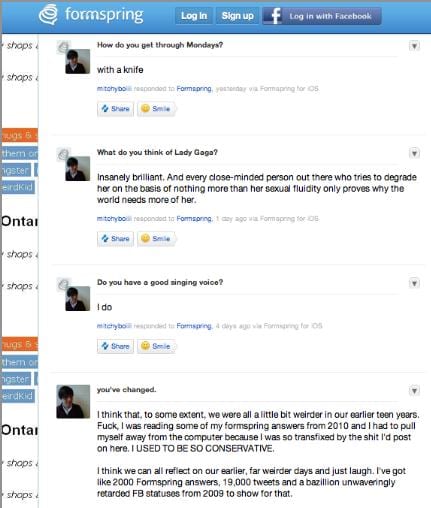
A screen capture of Burke's Formspring page. Credit: Courtesy of Burke's Facebook
Mitch Burke came out silently but with a bang — fitting for his social media generation.
One night in November 2010, the Ancaster, Ontario, student sat at a library computer and typed out a long Facebook status, telling his school, his community and the rest of the world that he is gay.
“After I hit ‘send’ I started to hyperventilate. Then I ran home. Oh my God. What have I done? Will anyone even notice?” Burke says.
The next morning, there were 180 “likes” on his post, he says proudly. Burke, who was 15 years old at the time, later walked into his Bishop Tonnos Catholic Secondary School math class to a standing ovation.
The Grade 11 student now wants to open the door so other gay students can follow his lead and come out, even if it’s just to friends and family. He wants to start a gay-straight alliance (GSA).
But the Hamilton-Wentworth Catholic District School Board (HWCDSB) this week denied Burke’s request, and HWCDSB board chair Patrick Daly told Xtra he will never allow any type of queer support group.
Burke is disappointed.
“The teachings of the Catholic Church, and the opinions of the students and teachers in a Catholic school, are very different, polar opposites of each other,” he says. “I really want to educate other students and create change at school.”
Over the past year, Burke has emerged as a social media star, role model and guinea pig for questions about sexual orientation from other students. He’s colourful and sassy with razor-sharp wit, a dandy for the Twitter generation.
Since he came out, Burke says, the bullying he used to experience has pretty much stopped. He says he still “hears the occasional ‘fag’ thrown around in the hallways. Mostly I got asked all the time, ‘Are you gay? Are you gay?’ After I came out people just stopped caring. I just wanted to be accepted and be loved for who I am, and that’s exactly what happened.”
Burke is now a familiar face in Ancaster. He started a Formspring page on which he answers questions from anyone, about anything. When he’s asked something particularly insulting or embarrassing, he tosses it back, with sarcasm and snark.
“I see lots of students at my school struggling with their identity,” he says. “I came out because of them.”
There are more than 1,200 other students at Bishop Tonnos, so Burke finds it hard to believe he’s the only one who’s gay. “That’s a scary thought. There are a few students who have told me privately they’re gay but haven’t made the move to say it publicly yet. I really hope I can change that.”
At school, he says, many students like the idea of a GSA and some teachers may also be on board.
This is not the first time an Ontario Catholic school student has been blocked from starting a GSA. Leanne Iskander and the students at St Joseph Catholic Secondary School in Mississauga were denied in March 2010.
Iskander’s group was eventually allowed to start a generic “equity group,” but they were forced to adopt the name “Open Arms” – the name her principal considered to be “Catholic sounding.” Iskander said the name means the group is not as visible to new students as it should be.
Burke says students should get naming rights for the group. “The name has to reflect LGBT,” he says. “A GSA is my main goal.”
However, Daly was adamant that GSAs will not be allowed in any HWCDSB school. He says he won’t permit any group focused on lesbian, gay, bisexual or trans issues, even if it’s called a generic name like Open Arms.
Daly says generic “anti-bullying clubs” are just fine, even if students disagree.
Burke says he wants a GSA because students don’t feel supported at school. Daly dismissed that claim: “They aren’t saying that in our system.”
Experts say GSAs make schools more welcoming and accepting for queer youth and have found they prevent bullying, depression and even suicide.
The Ontario Liberals recently tabled the Accepting Schools Act, which mandates GSAs in all schools. However, the bill contains a loophole that allows Catholic boards to continue to prevent students from calling their support groups GSAs. The legislation is heading to committee in February, then to a third reading.
Education Minister Laurel Broten did not respond to Xtra’s request for an interview on Jan 17, but on Dec 1 she was clear, noting, “There is no more debate on GSAs. If students want a GSA, it must be provided.”
Nancy Kirby, the president of the Ontario Catholic School Trustees Association (OCSTA) was quick to challenge Broten, telling Xtra that Catholic school administrators have no intention of allowing GSAs. They will “choose another name.”
OCSTA spokesperson Sharon McMillan says the position of the organization hasn’t changed. “They are not going to be called GSA. That name has become very controversial . . . A GSA is not a name that will be allowed in Catholic school.”
Casey Oraa, co-chair of Queer Ontario (QO), supports Burke. “This is happening all over Ontario, but students are scared to go public,” he says.
QO is submitting recommendations for the Accepting Schools Act. Oraa says the group wants the provincial government to tighten up the language so students are in charge of creating and naming their groups.
The bill needs teeth, he says. There is nothing in the language that forces boards like HWCDSB to comply with the legislation. “Without a compliance mechanism, how will the government ensure boards don’t just ignore the bill? Catholic boards have already said they will disobey the law.”
Meanwhile, Burke says he has no plans to stop fighting for a GSA.
“An anti-bullying club is just not good enough. I actually think the objective [of a generic equity club] is kinda lame because we all know which kids are mostly being bullied.”

 Why you can trust Xtra
Why you can trust Xtra


